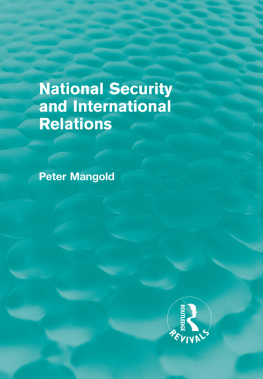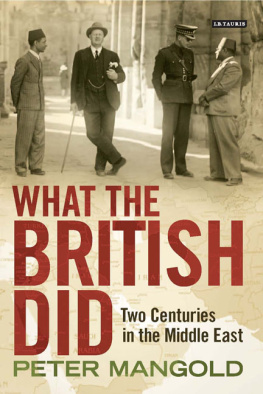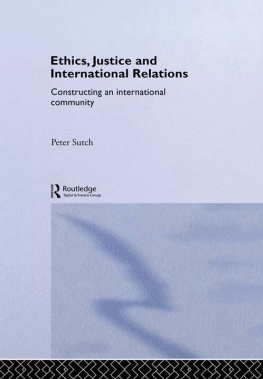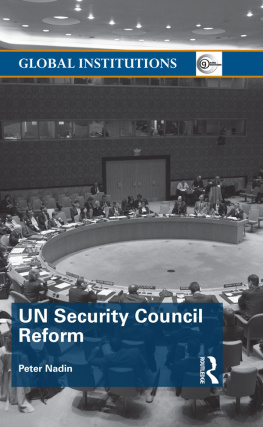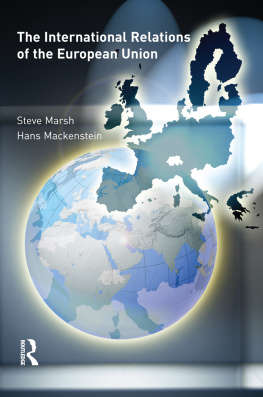Routledge Revivals
National Security and International Relations
First published in 1990, National Security and International Relations provides a concise analysis of the problem of national security in the twentieth century. It examines the criteria by which states decide what level of security they want to seek in an uncertain and essentially Hobbesian world, and why some states tend to underinsure, while obsessively insecure states overinsure, frequently making others more insecure in the process. In the wake of two world wars and the threat of nuclear destruction, the book argues that war was becoming as much a source of insecurity as the intentions of other states. It then explores the different approaches attempted during the twentieth century to ameliorate or ideally escape from the security dilemma. These range from international regimes, to the restructuring of the international politics of Western Europe so as to substitute cooperation for conflict, and U.S. and Soviet attempts to render nuclear competition safer through arms control and confidence building measures. This title will be of special value to students of International Relations and Strategic Studies.
Peter Mangold has worked in the Foreign and Commonwealth Office Research Department and the BBC World Service, and is currently Senior Associate Member of St Antony's College, Oxford. He has written widely on international affairs and is the author of Superpower Intervention in the Middle East (Routledge, 1978; Routledge Revivals, 2013).
First published in 1990
by Routledge
This edition first published in 2013 by Routledge
2 Park Square, Milton Park, Abingdon, Oxon, OX14 4RN
Simultaneously published in the USA and Canada
by Routledge
711 Third Avenue, New York, NY 10017
Routledge is an imprint of the Taylor & Francis Group, an informa business
1990 Peter Mangold
All rights reserved. No part of this book may be reprinted or reproduced or utilised in any form or by any electronic, mechanical, or other means, now known or hereafter invented, including photocopying and recording, or in any information storage or retrieval system, without permission in writing from the publishers.
Publishers Note
The publisher has gone to great lengths to ensure the quality of this reprint but points out that some imperfections in the original copies may be apparent.
Disclaimer
The publisher has made every effort to trace copyright holders and welcomes correspondence from those they have been unable to contact.
A Library of Congress record exists under LC control number: 89070273
ISBN 13: 978-0-415-83099-7 (hbk)
ISBN 13: 978-0-203-49468-4 (ebk)
First published 1990
by Routledge
11 New Fetter Lane, London EC4P 4EE
Simultaneously published in the USA and Canada
by Routledge
a division of Routledge, Chapman and Hall, Inc.
29 West 35th Street, New York, NY 10001
1990 Peter Mangold
Phototypeset in lOpt Times by
Mews Photosetting, Beckenham, Kent
Printed and bound in Great Britain by
Biddies Ltd, Guildford and Kings Lynn
All rights reserved. No part of this book may be reprinted or reproduced or utilized in any form or by any electronic, mechanical, or other means, now known or hereafter invented, including photocopying and recording, or in any information storage or retrieval system, without permission in writing from the publishers.
British Library Cataloguing in Publication Data
Mangold, Peter
National security and International Relations.
1. Foreign relations role of national security
I. Title
327.11
ISBN 0-415-02295-9
Library of Congress Cataloging in Publication Data
Mangold, Peter.
National security and international relations / Peter
Mangold,
p. cm.
Includes bibliographical references.
ISBN 0-415-02295-9
1. National security. 2. World politics 20th century.
I. Title.
| UA10.5.M34 1990 | 89-70273 |
| 327.0904-dc20 | CIP |
To my Mother
Contents
The origins of this study go back to the early 1970s when I was doing post-graduate work in International Relations at the London School of Economics. It was at this point that I first became interested in the elusive, at that time strangely remote concept of national security. The best informed people in Britain on matters appertaining to defence, one contemporary writer noted, are arguably teenage schoolboys who retain their traditional passion for aircraft and ships.1 That mood did not of course last. Within five years defence was again a matter of intense public concern. But what began to intrigue me were not the all-too-familiar strategic problems of deterrence and arms control, but rather the criteria for decision-making in an area of public policy entailing uniquely high degrees of risk and uncertainty. How did states (always assuming that one could discuss such complex entities without divorcing the language from the sometimes abstract, sometimes emotive nature of the problem) decide what costs to incur to ensure against dangers which might not even exist, or if they did might always remain speculative by virtue of the very precautions which had been taken against them?
Such choices were at once fascinating and fearful, real and unreal. What was in fact the real world? Was it that of the strategists and the highly classified threat assessments and position papers? Or was it that of day-to-day life, in which the fear of war alternated with a mood in which neither the appearance overhead of a military aircraft, nor a television report about a US-Soviet crisis or a war in some small country far away, seemed to impinge on the consciousness? How should we try to come to terms with the dilemma defined in Audens A Summer Night, written some forty years earlier?
And, gentle, do not care to know,
Where Poland draws her Eastern bow,
What violence is done:
Nor ask what doubtful act allows
Our freedom in this English house,
Our picnics in the sun2
Those may seem peculiarly Anglo-Saxon sentiments. They would hardly be intelligble to, say, an Israeli or Russian, whose countries for historical, and in the latter case ideological, reasons have a very different approach to security and very different security traditions. But they are at least a starting point for a broader enquiry into the nature of security and how our ideas on the subject have changed over a century in which war has increasingly become a threat in its own right, and into the attitudes which shape our awareness and tolerance of strategic risk.
Such an enquiry is of necessity time-consuming, and what follows is by no means intended to be a lull discussion of an immensely complex, intellectually difficult set of issues. The focus is on the problem of security as it affects those at the forefront of technological change, rather than on the large number of states which gained their independence in the aftermath of the Second World War. While many of their difficulties are indeed highly relevant to our discussion, others are much more a function of internal policy. Crucial as they undoubtedly are - the toll of conflict in the post-war years is a grim reminder of the prevalence of insurgency and civil war - they cannot be adequately covered in a study primarily concerned with the role of security in the relations between states.3

